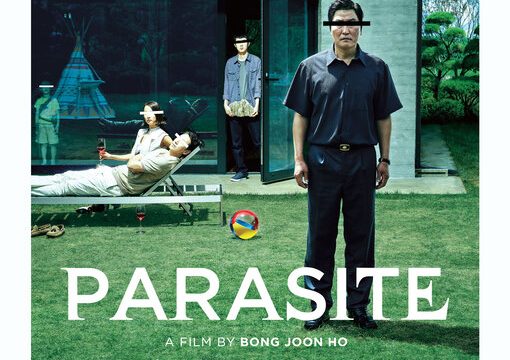Please forgive the vagueness of certain parts of this review of Parasite, as you’re bound to have heard by now, this is a movie that’s best to go into with little in the way of expectations on what exactly you’re getting into. Some movies merely use empty twists as a substitute for actual storytelling and then there are films like Parasite that are a master course in how to do twisty-turny storytelling right. Every inch of this intricately put-together production has a greater purpose and that includes the brilliantly executed revelations that upend the plot. Far be it from me to spoil such shocking moments so let’s instead spend this review combing over what a miraculous creation Parasite is in as spoiler-free of terms as possible.
Kim Ki-taek (Song Kang-ho) and his family, wife Chung-sook (Jang Hye-jin), son Ki-woo (Choi Woo-shik) and daughter Ki-jeong (Park So-dam), are a family living in poverty who are always on the hunt for a chance to earn more money. A friend of Ki-woo’s gives Ki-woo the chance to serve as the tutor for the daughter of the wealthy Park family, a position Ki-woo may not be perfectly qualified for, but hey, one forged document later and he’s got the job. It’s just a little lie, after all, and he’s doing it so his family can keep a roof over their heads. Soon, Ki-woo hatches elaborate plans to get the other three members of his family gigs working for the Park family. Sure, they’ve gotta bend the truth to get there, but what’s a little deceit when money is so scarce to the family?
As a famous Larryboy story once demonstrated, though, lies tend to add up over time and eventually, Parasite sends its plot into a wildly bold new direction in exploring Ki-woo and his family trying to keep all these lies in order. It’s a story that starts out with humorous treachery straight out of a screwball comedy as poorer members of society pull the wool over the eyes of the wealthy. You could totally see a similar plot being made in the 1930s with Cary Grant & Katharine Hepburn being the poor characters and Claude Rains being the patriarch of a wealthy clan. When Parasite is in this mode, it’s already plenty entertaining and extremely humorous while the script by Bong Joon-ho and Hae Jin-won does a remarkable job of effortlessly creating richly defined characters you could watch for hours on end.
If Parasite remained just as this type of film, it’d already be something special. But like a world-class gymnast following up an outstanding gymnastics routine with an equally impressive clarinet solo, Parasite eventually morphs into something gripping, something darker and something that takes an even more incisive look at financial inequality. Parasite really digs into the nitty-gritty of this topic in a fascinating manner that isn’t afraid to really delve into moral complexities in regards to how the lead characters are trying to evade their social status. Such exploration is aided by just how good Parasite is on a character-level, each of the characters in Parasite has a detailed perspective on the world that occupies morally grey shades rather than just fitting into tidy good-and-bad boxes.
Even the frequently amusingly oblivious wealthy Park family is show to have human dimensions, like in scenes where the Park parents show genuine affection for their kids. Such a movie feels par for the course for a Bong Joon-ho movie since his works are constantly undercutting the morality expectations of both the viewers and characters. Remember how the mythic figure revolutionary Chris Evans was trying to get to during the entire course of Bong Joon-ho’s Snowpiercer turned out to be just a normal guy who orchestrated the whole revolution for his own means? That’s the kind of bold, brilliant and thought-provoking storytelling found throughout Joon-ho’s works and in Parasite as well.
Not only does this recurring storytelling trait help to reflect the complex moralities of the real world, but it also makes for thrilling cinema as you sit there in your seat uncertain over what the plot or characters could do next. That sensation is felt all throughout Parasite, which keeps you captivated from start to finish thanks to how writers Bong Joon-ho and Hae Jin-won come up with so many engrossing suspenseful scenarios to toss the characters through. Such sequences are enhanced by the editing of Yang Jin-mo, whose in rare form here in terms of his precise sense of timing that makes for some exquisitely executed sequences. A montage sequence depicting Chung-sook and her family trying to get her a job working for the Parks is an especially showcase for his editing skills.
Parasite’s visual strengths also extended to Bong Joon-ho’s masterfully confident direction and Hong Kyung-pyo’s cinematography. Both of these individuals lend the film a visual look that helps to accentuate tension by constantly showing how there’s so much more going on around the Park characters than they realize. Throughout Parasite, we get wide shots showing one or two members of the Park family going about their business oblivious to the fact that either their own kids or members of Kim Ki-taek’s family are hiding in the shadows listening in on their conversations and following them closely. It makes for some gorgeous looking imagery and, writing it down, I now realize it could also be a visual symbol for how the wealthy are able to ignore the poorer members of society but the latter class are always still existing on the fringes of society (or, in this case, the frame). Good God, what a massively detailed work of thrilling cinema Parasite is!

